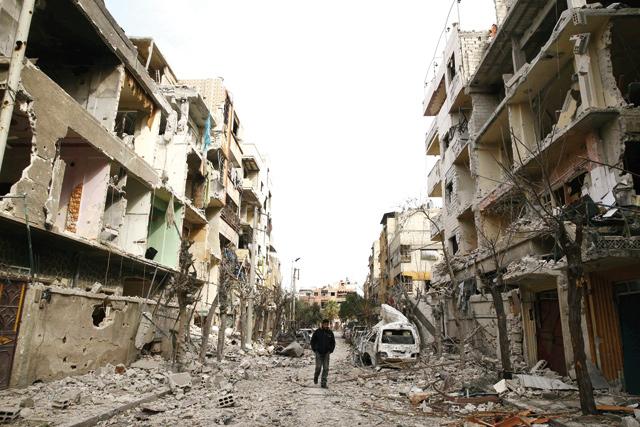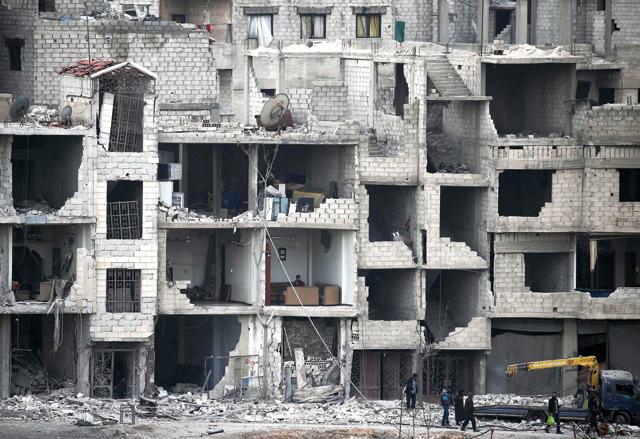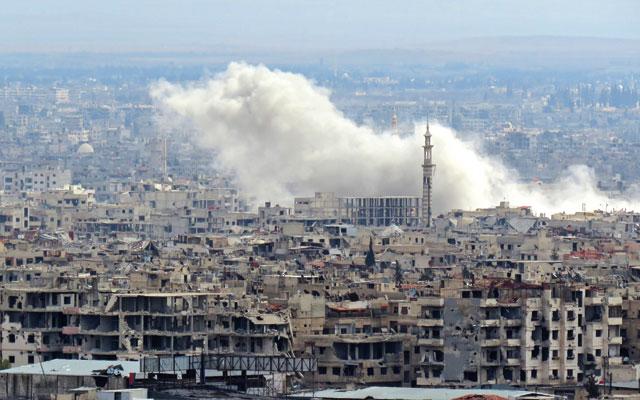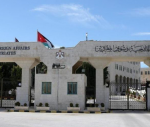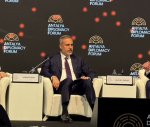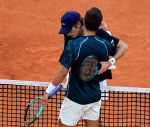You are here
UN Security Council calls for truce as air strikes batter Syria’s Ghouta
By Reuters - Feb 24,2018 - Last updated at Feb 24,2018

A civil defence volunteer, known as the White Helmets, checks the site of a regime air strike in the rebel-held town of Saqba, in the besieged Eastern Ghouta region, on Saturday (AFP photo)
BEIRUT/UNITED NATIONS — Rescuers in Syria’s eastern Ghouta said the bombing would not let up long enough for them to count the bodies during one of the bloodiest air assaults of the seven-year war, while the UN Security Council called for a 30-day humanitarian truce.
The vote at the United Nations came as warplanes pounded Eastern Ghouta, the last rebel enclave near Syria’s capital, for a seventh straight day while residents holed up in basements.
The Security Council approved a resolution demanding a 30-day truce to allow aid deliveries and medical evacuations with the support of Syrian ally Russia after a flurry of last-minute negotiations.
Medical charities have decried attacks on a dozen hospitals but the Damascus government and Russia, its key ally, say they only target militants. They have said they seek to stop mortar attacks injuring dozens in the capital, and have accused insurgents in Ghouta of holding people as human shields.
There was no immediate comment from the Syrian military.
A surge of rocket fire, shelling and air strikes has killed more than 500 people since Sunday night, the Syrian Observatory for Human Rights said. The dead included more than 120 children.
The Britain-based monitor said raids hit Douma, Zamalka and other towns there on Saturday, killing 31 people.
First responders searched for survivors after strikes on Kafr Batna, Douma and Harasta, the Civil Defence in Eastern Ghouta said. The rescue service, which operates in rebel territory, said it had documented at least 350 deaths in four days earlier this week.
“Maybe there are many more,” said Siraj Mahmoud, a civil defence spokesman in the suburbs. “We weren’t able to count the martyrs yesterday because the warplanes are touring the skies.”
As the bombs rain down, some hitting emergency centres and vehicles, workers have struggled to pull people from the rubble, Mahmoud said. “But if we have to go out running on our legs and dig with our hands to rescue the people, we will still be here.”
A witness in Douma said he woke up in the early hours on Saturday to the sound of a squadron of jets bombing nearby. The streets have mostly remained empty.
The United Nations says nearly 400,000 people live in Eastern Ghouta, a pocket of satellite towns and farms under government siege since 2013, without enough food or medicine. The local opposition council said it was setting up emergency volunteer teams in several districts to reinforce shelters with sandbags and try to link them through tunnels.
“Everyday we say God willing tomorrow will be better...Today, the main sight in the Ghouta is limbs, blood,” Mahmoud said. “There is no need to dig graves, we will be buried under our houses.”
Ceasefire vote
The UN Security Council is to vote on Saturday on a draft resolution which demands a 30-day ceasefire across Syria to allow aid access and medical evacuations.
The 15-member council postponed voting on the text, which Sweden and Kuwait drafted. The delay followed a flurry of last-minute talks after Russia, a veto-holding ally of Syrian President Bashar Assad, proposed new amendments.
The truce does not cover militants from Daesh, Al Qaeda, and the Nusra Front.
Several previous ceasefire attempts have quickly unravelled during the multi-sided conflict, which has killed hundreds of thousands and forced 11 million people out of their homes.
Syrian state media said Ghouta factions fired mortars at districts of Damascus on Saturday, including near a school. Insurgent shelling wounded six people, it said, and the army heavily pounded militant targets in the suburbs in response.
The Ghouta pocket has become the war’s latest flashpoint, after a string of rebel defeats and negotiated withdrawals. With Russian jets and Iran-backed militias, Assad’s military has restored state rule over the main cities across western Syria.
Insurgents in Eastern Ghouta have vowed not to accept such a fate, ruling out the kind of evacuation that ended rebellion in Aleppo and Homs after bitter sieges.
Russia has blamed Nusra fighters, from Al Qaeda’s former Syria branch, for provoking the situation in the Ghouta. The two main Islamist factions there in turn accuse their enemies of using the presence of a few hundred extremist fighters as a pretext for attacks.
Related Articles
DOUMA, Syria — New regime air strikes and heavy clashes shook Syria's rebel enclave of Eastern Ghouta on Sunday despite a UN demand for a ce
BEIRUT/MOSCOW — Russia will establish a humanitarian corridor and implement a five-hour daily truce in Syria's Eastern Ghouta, it said on Mo
DOUMA, Syria — A humanitarian "pause" announced by Russia in Syria's deadly bombardment of Eastern Ghouta struggled to take hold Tuesday, wi


